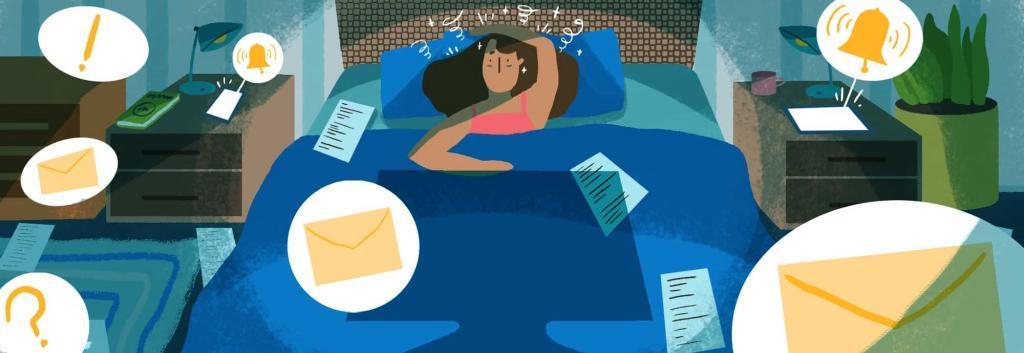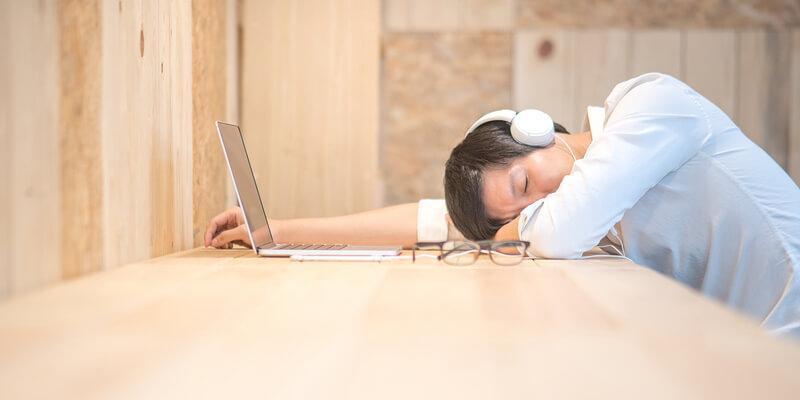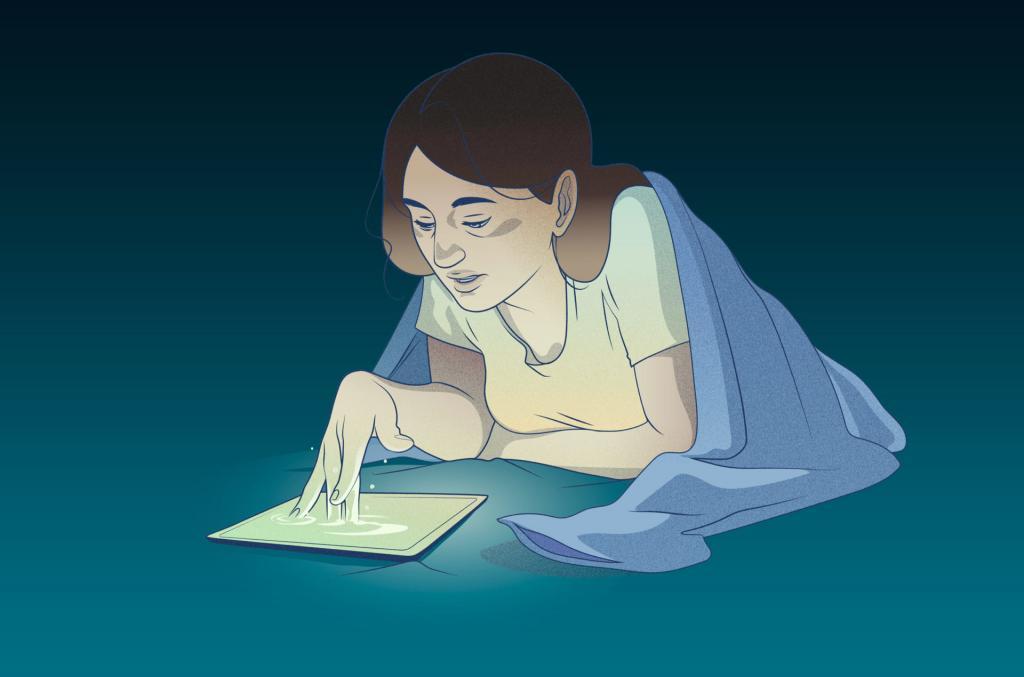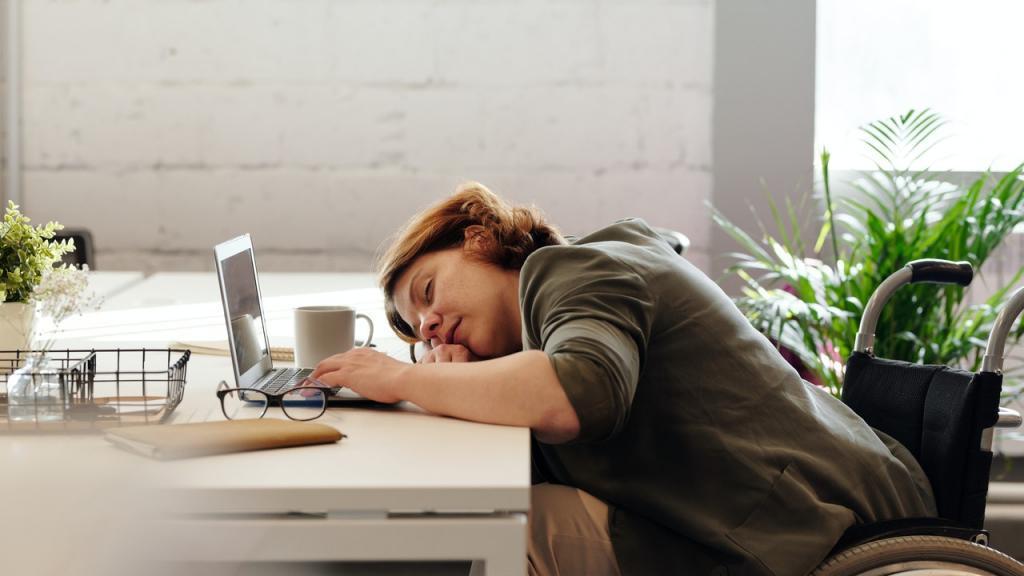For many of us, working remotely – whether from home or any other location outside of an office – has become second nature in the previous few years. As of 2020, there has been a massive increase in the number of people working remotely. From 6% of full-time employees to over 13% in the United States alone, working from home is now the norm for many companies. Working from home has a number of advantages, including eliminating the hassle of a daily commute, increasing productivity, and improving general well-being.
Workers who work remotely face the disadvantage of having to be constantly online, responsive, and readily available despite these benefits. The technology we use to stay in touch, as well as our need to be always connected, might have a negative impact on our sleepover time. With hybrid and remote working becoming more common, we must learn to better manage our online and offline time so that we don’t miss out on a good night’s rest.

Why Can Remote Work Affect Sleep
Hard to Get Away From Work
At the end of the day, if you commute to work, you’re usually able to leave the office and return home. When you’re working from home, it might be difficult to maintain a clear boundary between your personal and business lives.
Working in your bedroom has the potential to disrupt your sleep. Even while it may seem cozy to sit up in bed and work on your laptop, doing so can keep your mind from drifting off to sleep.
Too Much Freedom
Working from home gives many people the freedom to choose their own hours. Late start times or distractions can cause you to find yourself scrambling at the end of the day to complete your work. The generation of melatonin, a hormone that aids in sleep, is reduced by exposure to blue light in the evening.
Your circadian rhythm, which governs your sleep-wake cycle, can be disrupted by changing your job schedule. Working at 7 a.m. one day and 2 p.m. the next will confuse your body’s internal clock and make it difficult to sleep and wake up at the proper times each day.
Stress
Even if you work from home, you may still experience stress from your job.
There are always deadlines and expectations to achieve, even if you don’t have to deal with the stress of the daily commute.
People who collaborate on group projects while working remotely may find themselves unable to fulfill deadlines, which is a unique stressor for those who work from home. And freelancers who work from home may worry about finding a new gig. Sleep difficulties were connected to job instability by a 47% rise in a 2019 study.
Loneliness
Your daily interactions with other people are likely to be less if you’re working from home. In your case, social isolation and loneliness are not the same things. The following is a definition from a scientific article:
- When you have few or no social contacts and interactions, you’re in social isolation.
- How much you want to interact socially and how much time is spent doing so is the basis for feeling lonely, as is the amount of time spent doing so.
Overwhelming loneliness has been shown to increase stress and the risk of heart disease, arthritis, diabetes, and dementia among other health problems.
Loneliness has been linked to an increased risk of insomnia in several studies.
And if you’re attempting to replace face-to-face engagement with social media, what are your options? As a result of spending too much time on social media, you may not get enough sleep.
Use social media in moderation, not abstain from it completely. A 2018 study recommends 30 minutes of exercise per day.
Pain from Poor Posture
Pain in the back, shoulders, and neck is all too prevalent when your home office isn’t set up properly. Chronic pain is frequently implicated as a cause of sleeplessness. You may have trouble sleeping if you don’t take actions to relieve or prevent pain.
Remote work and its effect on sleep
- A lot of people’s sleep patterns were disrupted when they made the switch from being in an office to working remotely. It took some time for them to get used to the new routine.
- When you don’t have to deal with the stress of a morning commute or an early wake-up, your body is more likely to wake up in a light sleep phase. However, for some people, this may lead to an increased predisposition to go to bed late, sleep in, and miss out on their regular sleep time.
- As a result, our brains have a tough time switching from “work mode” to “sleep mode” when working from home.
- Working from home while caring for a child means that parents have less time for sleep because they may choose to work longer hours in an effort to complete projects.
- In a work-from-home environment, stress levels might grow and interfere with sleep if you don’t feel like you can unplug. As a result of these fears, people’s stress levels are heightened.
- Employees spent more time in front of a computer screen as a result of the shift from in-person meetings to online ones. The blue light from these screens may have an effect on sleep, especially for people who work late into the night.
How to improve sleep when working from home
1. Set boundaries and clear working hours: Working remotely blurs the barrier between business and home life, so it’s up to you to decide where the line is drawn between the two. This is essential for ensuring a healthy work-life balance and ensuring that you have enough time to relax and unwind before going to bed.
Go for a stroll or do anything little to indicate to your brain that “work is over for the day,” so that your body and mind know it’s time for a break. “We’re taking it easy now.” Don’t let work-related notifications keep you awake at night by turning them off on your personal devices.

2. Soak up some sunlight: Our sleep and waking cycles are influenced by our circadian rhythms, which are regulated by exposure to natural light. In contrast to commuting to the office, working from home can make it difficult to even leave the house during working hours. When the sun is shining, getting some fresh air and exercise may help you sleep better at night. In order to get a better night’s sleep, exposure to natural light in the morning is extremely beneficial.
As much as possible, set up your work-from-home office in an area where you can enjoy the changing rays of the sun throughout the day. Dimming the lights at the end of the day can serve as a cue to your body that it’s time to wind down for the night.
3. Prioritize a wind-down routine: before you go to sleep: When you work from home, it’s critical that you establish a pleasant evening routine that helps you wind down. You can do this by meditating, reading, listening to soothing music, or writing in a journal. You can also keep track of sleep-disrupting habits by journaling about them often.
When it comes to splitting up the workday into manageable chunks, it’s crucial to take breaks throughout the day. When you work from home, you’ll have to plan out your breaks ahead of time, unlike when you work in an office.
4. Stick to a sleep schedule: Working from home threw most people’s schedules for a loop and messed up their sleep cycles. We desire routine and snoozes because you no longer have to get up and commute to work can throw our bodies out of whack. The best way to get back on track with a regular bedtime and wake-up schedule is to set one. Even on a Monday morning, it’s best to stick to your plan.
5. Create a good environment for sleeping and working: Create a distinct workspace that you exclusively utilize during working hours in order to create an effective barrier between working and resting (and thereby making it easier to sleep). Your bedroom should not serve as a workspace, but we understand that this is not always possible.
When possible, try to avoid working in your bed. Being unable to sleep is made more difficult by the association your brain forms between working from bed and being awake. Make sure your room is cool, quiet, and dark before you go to sleep.
6. Find time to move: A Slack message could come through while you’re away from your desk, and you may fear that you’ll miss it. It’s possible to improve your sleep with just 30 minutes of activity a day, though.
7. Limit screen time at night: While scrolling through TikTok before bed or checking email one more time, our smartphones emit blue light, which can boost attentiveness and induce sleep disturbances. In addition, the activities you engage in on these gadgets might keep you awake well into the night, making it more difficult for you to fall asleep. At least 30 minutes before going to sleep, put down your devices and allow yourself time to relax.
8. Get dressed for work: As tempting as it may be to just jump out of bed and start working in your PJs, focus on getting clean and dressed first before you get started. For those who want to wake up at the same time each day, this can be a useful distinction.
The quality of your sleep and the quality of your work can be greatly improved by balancing your online and offline time while working remotely. Prioritize a good night’s sleep in order to arrive at work rested, healthy, and energized, ready to take on whatever the – far-off – day brings!

Balancing Remote Work and Personal Life
It may take some time before you achieve a healthy work-life balance. However, if you make a few tweaks, you might be able to get the best of both worlds while working from home. Among them are:
- Find a Replacement for Your Commute: You can help your brain learn the difference between working and relaxing by adopting a few simple tactics. Making your bed, taking a shower, and putting on work clothes are all good examples of getting ready for the day. Put away your computer and other work supplies at the end of the day.
- Make a Schedule: Avoid letting work take over by establishing clear standards and scheduling time for exercise, good meals, and personal time in your day.
- Keep a Regular Bedtime: It may be possible to work from home if you don’t enjoy the nine-to-five workday and would prefer a more flexible schedule. Just remember that going to bed and waking up at the same time every day can help you sleep better.
- Set Work Hours: Explain to your loved ones that you may be unavailable at specific times due to your job. Set boundaries with coworkers about not invading family time, and do your best not to read email after work hours. Similarly
- Take Breaks: Make a cup of tea, chat with your family, or go for a brief walk every now and then, just like you would when you’re working in an office. Take a few minutes to stretch your legs and give your eyes a break from staring at a computer monitor.
- Stay Healthy: Sleep and productivity can be improved by eating healthily and exercising regularly.
- Practice Self-Care: If you’re feeling down, reach out to your friends and family for support and practice relaxation techniques like mindfulness.
Creating a physical barrier between your work and personal environment may help you adapt to working from home.
Creating Your Home Office
There are a number of factors to take into mind while setting up a home office:
- Pick a Calm Place: It’s ideal to have an area where you can work in peace, apart from the rest of the house. Consider using a curtain or a room divider to separate your workspace from the rest of the room if you’re working in a shared environment.
- Factor in Ergonomics: Adjust the height of your chair, desk, and computer monitor to suit your own preference. – – Consider purchasing a keyboard, mouse, and laptop stand to lessen the pressure on your neck from constantly staring at your computer screen.
- Seek Quiet: Turn off the television, your phone’s notifications, and anything else that can be a source of distraction. You might be able to concentrate better if you use headphones or earplugs if other family members’ loudness bothers you.
- Keep the Workspace Neat: Clearing clutter and keeping a clean and tidy workstation can help alleviate stress.
- Take Advantage of Natural Light: You can reduce eye strain and stay attentive if you have a well-lit workplace. Natural light can improve your mood during the day and aid your sleep at night if you have access to a window and sunlight.
When working from home, it’s best to avoid turning your bedroom into an office. As a result, it becomes tough to disconnect from work while you’re attempting to fall asleep because of the harmful links you’ve formed between your bed and work. The bed is perhaps not the most comfortable place to work.
However, if you share a home or a studio apartment, you may be forced to work from your bed.
Tips for Better Sleep When Working From Your Bedroom
If working from home is your only option, the following suggestions will help you get the rest you need:
- Don’t Work in Bed: In order to have a good night’s sleep, your brain needs time to relax. Standing desks can be made from repurposed closet shelves if you don’t have much room. Your bedroom furniture can also be used to divide your workspace from your resting place, making it easier to distinguish the two.
- Take Breaks in Another Room: Take your breaks in a different room or go for a stroll for a change of environment.
- Turn Off Screens One Hour Before Bedtime: Sleep specialists advocate removing electronic gadgets with backlit screens from the bedroom since they emit blue light that disrupts sleep. Instead of staring at a screen for the last hour before you go to sleep, try reading a book or listening to music if you must work in your bedroom.
- Follow a Bedtime Routine: Brush your teeth, put on pajamas, and relax with a book or music as part of a basic night routine.
- Practice Healthy Sleep Hygiene: Optimizing your bedroom for sleep at night is especially crucial if your bedroom also acts as an office. Make an effort to make your bedroom a relaxing and welcoming space. This may entail turning down the heat and turning down the volume of any background noise.
Working from home doesn’t have to mean sacrificing your sleep. Work-from-home office ideas that help you sleep better and get more done can help you be more productive while you’re at home.
Frequently Asked Questions
How can I stay awake while working from home?
The following suggestions will help you wake up if you had a bad night’s sleep and are having trouble staying awake:
- Get some fresh air by going for a stroll in the morning or during a break. Sitting in one place for long periods of time can make you feel weary, but moving around can keep you awake and focused.
- It’s possible to stroll and work at the same time, for example, when you’re on the phone.
Take a few seconds to cool off in the shower. - Work in a well-lit environment. If you can, let in some natural light, or if you can’t, use bright lighting.
- If you find yourself exhausted when working on a challenging assignment, consider moving to an easier one. Taking a few minutes to respond to emails can allow your mind to recuperate.
- A cup of coffee will help you get out of bed, but don’t forget to drink water.
- If you’re dehydrated, you may experience fatigue or dizziness.
- Snack on protein and carbohydrate-rich foods whenever hunger strikes. Sugary foods and beverages should be limited in your diet.
- Help yourself out of bed by listening to a little music—you can go for pop or rock ‘n’ roll as well as metal. If you’re home alone, you can turn the volume all the way up.
Does working from home make you tired?
It’s possible for a variety of reasons:
- As a result, you may find it more difficult to drift off to sleep at night if you work in your bedroom.
When you begin working from home, your daily routine is altered. It’s easy to ignore sleep-wake cycle signs like sunlight and exercise if you’re cooped up all day. - In the workplace, the border between personal and professional life can be blurred by working from home. As a result, they work longer hours because they find it difficult to separate their job life from their home life.
- When working from home, the vast majority of people use a computer. At the same time, the blue light from your computer screen can make it difficult to drift off to sleep later. The amount of time you spend on social media can also affect your sleep.
- Working from home can lead to feelings of isolation, especially if you live alone. Loneliness can turn into sadness, which can lead to sleep deprivation.
How long can you go without sleep?
The longest time a person has gone without a night’s sleep in the globe is 264 hours. Because the Guinness Book of World Records no longer accepts entries for sleep deprivation, that record is likely to remain unbroken. One night of little or no sleep for the majority of us is enough to wake us up in the morning.
Are three hours of sleep enough?
Three hours of sleep is insufficient for a restful night’s sleep. In order to wake up feeling rejuvenated the next day, most adults require a minimum of seven hours of sleep per night. Professional athletes, for example, frequently require 10 hours of sleep per night for optimal recuperation.
In any case, getting some sleep is always preferable to not getting any at all. If a person has completed two sleep cycles, they may even feel rested when they wake up. It takes 70 to 100 minutes for the first sleep cycle to complete, and 90 to 120 minutes for the subsequent ones, according to Harvard Medical School.

How much sleep do I need by age?
As we get older, the amount of sleep we require decreases:
- Infants between the ages of 0 and 3 months old require 14 to 17 hours of sleep per night.
- Between the ages of four and 11 months, infants should sleep between 12 and 15 hours.
- Toddlers (those between the ages of one and two) require between eleven and fourteen hours of sleep per night.
- Between the ages of three and five, children need 10 to 13 hours of sleep every day.
- Children between the ages of 6 and 13 require between 9 and 11 hours of sleep per night.
- Teenagers (between the ages of 14 and 17) require 8 to 10 hours of sleep per night.
- Between 7 and 9 hours of sleep is needed by those ages 18 and 25.
- As for adults (aged 26 to 64), they too need 7 to 9 hours of sleep.
- Those over the age of 65 need between 7 and 8 hours of sleep each night.

![Top Rated CPAP Machine Buyer’s Guide [current_date format=’m/Y’]](https://bestpillowsleepers.com/wp-content/uploads/2023/03/best-cpap-machine-img_6405d72310053-400x300.jpg)
![The 11 Best Cooling Weighted Blankets [current_date format=’m/Y’]](https://bestpillowsleepers.com/wp-content/uploads/2023/01/best-cooling-weighted-blankets-img_63d4ff15c615d-400x300.jpg)
![Ultimate Guide to Choosing a Best Cooling Mattress Pads [current_date format=’m/Y’]](https://bestpillowsleepers.com/wp-content/uploads/2023/01/best-cooling-mattress-pads-img_63c403115126b-400x300.jpg)
![Ultimate Guide to Choosing a Best Cooling Mattress [current_date format=’m/Y’]](https://bestpillowsleepers.com/wp-content/uploads/2023/01/ultimate-guide-to-choosing-a-best-cooling-mattress-img_63bcdba870d77-400x300.jpg)
![Ultimate Guide to Choosing a Best Cooling Comforters [current_date format=’m/Y’]](https://bestpillowsleepers.com/wp-content/uploads/2023/01/ultimate-guide-to-choosing-a-best-cooling-comforters-img_63bba2f5cd3ce-400x300.jpg)